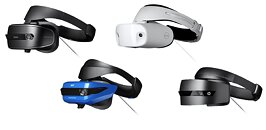- Joined
- Oct 9, 2007
- Messages
- 47,695 (7.42/day)
- Location
- Dublin, Ireland
| System Name | RBMK-1000 |
|---|---|
| Processor | AMD Ryzen 7 5700G |
| Motherboard | Gigabyte B550 AORUS Elite V2 |
| Cooling | DeepCool Gammax L240 V2 |
| Memory | 2x 16GB DDR4-3200 |
| Video Card(s) | Galax RTX 4070 Ti EX |
| Storage | Samsung 990 1TB |
| Display(s) | BenQ 1440p 60 Hz 27-inch |
| Case | Corsair Carbide 100R |
| Audio Device(s) | ASUS SupremeFX S1220A |
| Power Supply | Cooler Master MWE Gold 650W |
| Mouse | ASUS ROG Strix Impact |
| Keyboard | Gamdias Hermes E2 |
| Software | Windows 11 Pro |
Microsoft is discontinuing Windows Mixed Reality. This was discovered when the company added it to a list of deprecated Windows features. The Windows Mixed Reality platform, along with its accompanying Mixed Reality Portal app, and Mixed Reality for Steam VR, are on the list. For now it is deprecated, and Microsoft says that it will be removed in a future release of Windows. Mixed Reality was released in 2017, during the thick of the VR craze in the tech industry, a time when Facebook, having acquired Oculus, and betting big on the Metaverse, an endeavor that cost the company over $20 billion since. Mixed Reality served as a gateway to games and apps in the VR space. The company developed its own HoloLens Mixed Reality headset rivaling Oculus Rift, and got its OEM partners, such as Acer, Dell, Lenovo, ASUS, and HP, to invest in ones of their own. In all this, it doesn't look like Microsoft is winding down its enterprise-focused HoloLens 2 headset just yet.

View at TechPowerUp Main Site | Source

View at TechPowerUp Main Site | Source





